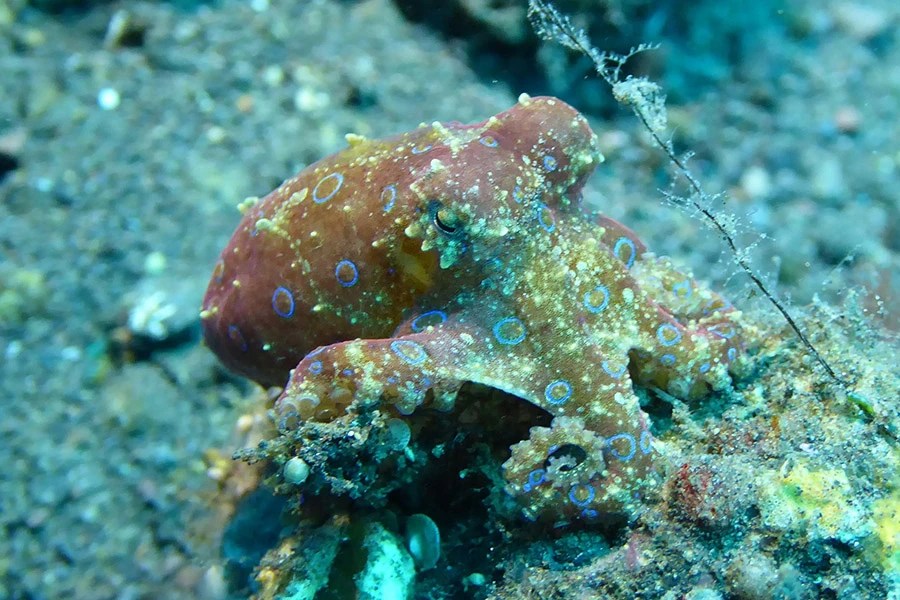Not all species of octopuses are dangerous. The most potentially dangerous species is the blue-ringed octopus. These species are considered dangerous because they have venom, which is fatal to humans.
The variety of poisons this octopus has include histamine, octopamine, taurine, dopamine, acetylcholine, and tetrodotoxin, among others. All these venoms can kill humans within a few minutes.
Are Octopuses Dangerous to Humans?
Octopuses are not dangerous because they do not attack humans. They only attack humans if they feel threatened or are defending their territory. An octopus avoids contact with humans by staying away from the water.
Can an Octopus Hurt You?
Yes, but octopuses will only attack you when you threaten them. They are very peaceful when left alone and will only employ aggression when they consider you a real threat.
Also read: What Do Octopuses Eat? All About The Octopus Diet
Can an Octopus Kill You?
Yes, the blue-ringed octopus and the giant Pacific octopus can kill a human within minutes after a bite. This is because, as these octopuses bite you, they inject their venom into your system.
Are Octopuses Poisonous?
Yes, all species of octopuses are poisonous, but some have more potent poisons than others. The octopuses with stronger toxins include blue-ringed octopus, mimic octopus, and giant Pacific octopus, among others.

Are Octopuses Venomous?
Yes, all octopuses are venomous. However, some species do have higher venom toxicity than others. It is best to avoid octopuses in the wild as they can be dangerous.
Also read: What Eats Octopus? Top 12 Octopus Predators
Do Octopuses Bite?
Yes, all species of octopuses can bite. But, they hardly bite, except in some rare cases.
How Strong Is An Octopus?
This depends on the species of octopus. Some species are stronger than others. For example, the giant Pacific octopus can overpower a human quickly, while some species cannot overpower humans.
Frequently Asked Questions
Are Blue-Ringed Octopuses Dangerous?
Yes, blue-ringed octopuses are dangerous due to their venom. Their venom is a thousand times more potent than cyanide. Additionally, their poison can kill as many as 26 humans within a few minutes.
What is the Deadliest Octopus?
The blue-ringed octopus is considered the deadliest octopus. This is because as this octopus bites you, it injects its venom called tetrodotoxins into your system.
This venom is very potent and acts fast by blocking nerves from transmitting impulses, which in turn causes paralysis and difficulty in breathing due to lack of oxygen.
Has an Octopus Ever Killed a Human?
Deaths due to octopuses are extremely rare, but three recorded deaths have been attributed to blue-ringed octopuses and their venom. There has not been a case of a human being killed by an octopus again.
Has an Octopus Ever Eaten a Human?
No, an octopus has never eaten a human. Generally, octopuses do not take humans as a food source. Instead, they depend on smaller animals as food sources, such as mollusks, shrimps, crabs, and fish. However, they can latch onto bigger animals and bite them.
What is the Most Poisonous Octopus?
The blue-ringed octopus is the most poisonous. The blue-ringed octopus is vibrant and small but exceptionally deadly. You should know that about ten species of blue-ringed octopus exist, but only four have been scientifically assigned names.
Do Octopuses Sting?
Yes, octopuses can sting. An octopus sting in humans can cause swelling and bleeding. Their bite is generally painless, but the effect of the bite is numbness around the tongue, mouth, face, and neck. Additionally, you will feel tight in your chest, leading to difficulty in breathing.
Is Octopus Ink Toxic?
Research is still going on about the toxicity of octopus ink. However, octopus ink is considered not toxic since it’s been used in Mediterranean and Japanese cuisines. Octopus ink is usually black due to melanin. The dark color of this ink is used to enhance the appeal and flavor of sauces, rice dishes, and pasta.







